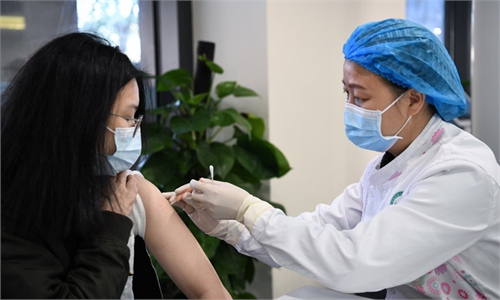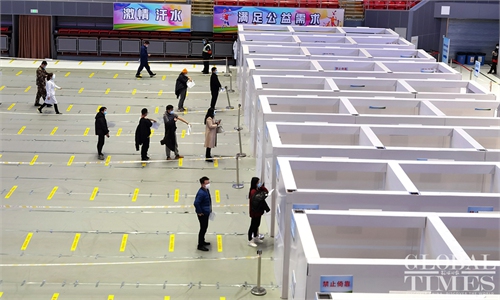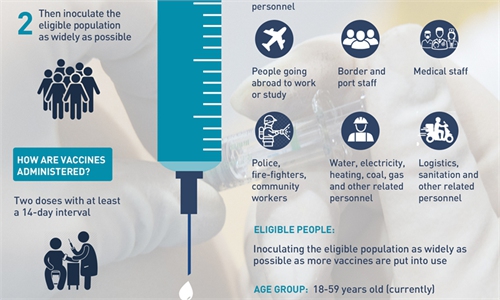Vaccine alone cannot win fight against COVID-19 without mobilizing society: Global Times editorial

An illustration shows vials of a COVID-19 vaccine and syringes with the logos of US pharmaceutical company Pfizer and German partner BioNTech. Photo: AFP
After COVID-19 vaccines are developed, it will be a new test for countries to figure out how to carry out vaccination so as to protect people from the virus as soon as possible and reach herd immunity.
The US has led the world in vaccine development and approval, while it is also the hardest hit country by COVID-19. Such a country should have immediately started nationwide vaccination to save more Americans. However, such a scenario is nowhere to be seen in the US. Instead, the vaccination is carried out slowly - governments at all levels haven't effectively organized vaccination, while many people are indifferent to it. Only one-fifth of the vaccination plan has been completed in the US.
A vaccine is a powerful weapon against the pandemic. But as the virus has spread extensively, the effect of vaccines is similar to water hoses against a wildfire. Other measures must be taken simultaneously to stop it from spreading, and finally being eradicated. But the US' problem is it hasn't organized well let alone prepared with corresponding measures. The weakness of the US government's capability to handle a public crisis really makes one speechless.
No wonder the US administration has been trying hard to hold China accountable for the COVID-19 epidemic in the US - Washington can barely do anything else.
The US lacks a national system in which the entire country can be mobilized in the face of a certain crisis. The US federal government does not hold direct authority above state governments, and it lacks appeal to grassroots Americans. Moreover, partisan divisions can be seen everywhere. The epidemic exposed the serious lack of ability to adjust and allocate large amounts of resources for a major goal, such as an epidemic fight.
Public health experts have warned that the US could add another 200,000 deaths due to COVID-19 by April 1. Even such a warning cannot touch American society as a whole. The current US federal government, which is at the end of its tenure, is indifferent. Many Americans still refuse to be vaccinated and there are many who despise people who wear masks. With vaccines, the US is still not taking the COVID-19 fight seriously.
The current performance of the US is worrying. Only when it is facing a greater loss of life and some of its Western allies have controlled the epidemic with the use of vaccines can American society come to realize the truth. The Biden administration may not be able to change the current weakness of the US' COVID-19 fight. Facts have proven that as long as the middle class is not generally mobilized, the government's driving force will be very limited.
The US has long been the world's most developed country. During wars, the US mainly relies on its overwhelming advantage in weapons. When Pfizer's vaccine first came out, many Americans regarded it as an aircraft carrier or even an atomic bomb that could bring victory. But in fact, it is perhaps not.
The final outcome of the world's COVID-19 fight may depend on whether the US and the West can carry out important reforms to make up for their shortcomings in social organization and mobilization. If so, zero new COVID-19 cases may become possible in their societies.
In the 1980s and 1990s, China redefined the political nature of the market economy, and made sure it is applicable to China as a way of organizing economic activities. Today, the US should also carefully examine the differences in the COVID-19 fight between the West and China as well as other Asian societies. The US should completely depoliticize the methods and routes in fighting COVID-19. As long as they help contain the epidemic, they are worth learning and adopting.
The US and its major European allies need to sort out their social governance methods and face up to the weaknesses that are not conducive to dealing with major public crises. They need to put ideology aside and respect the basic fact that different societies have their own strengths. While fighting the COVID-19 with the world, they should learn from other countries' experience and realize the improvement of their own national governance system.



